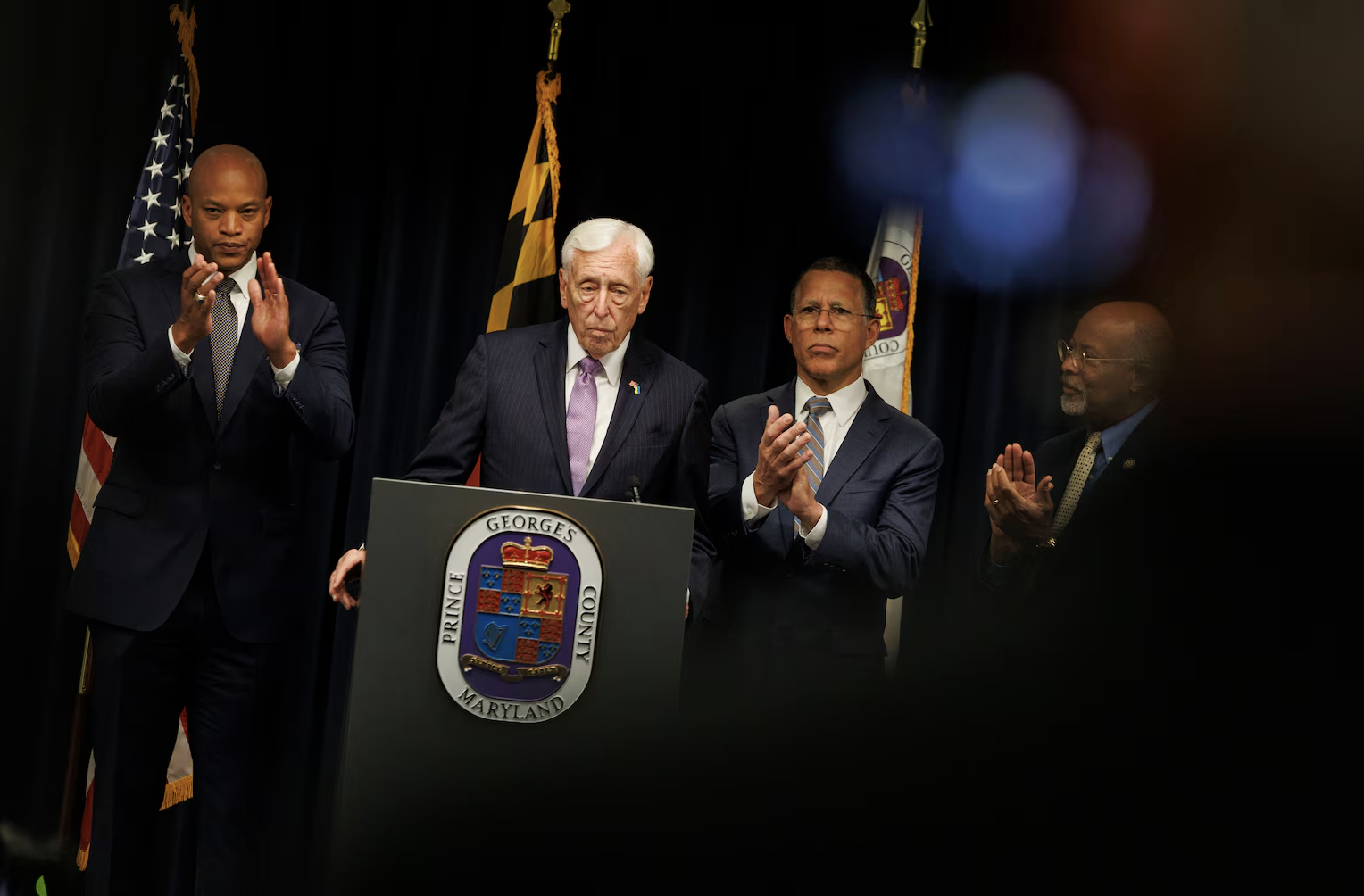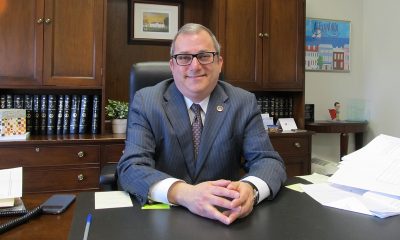Local
Early win could be only pro-LGBT victory this year in Va.
A bill to reinstate sexual orientation in Virginia’s public employment non-discrimination policy passed the state Senate last week — marking what some LGBT activists fear could be their only success this year.
Virginia Partisans President Terry Mansberger said a near total shut-out by the minority Republican senators on Senate Bill 66 means it’s unlikely to see a vote in the Republican-controlled House. And he noted that any other LGBT-inclusive bill could meet the same fate.
“When you put forward things like this that protect people from discrimination, most people agree that’s wrong,” he said. “But the teabaggers who’ve taken over the Republican Party think any legislation that helps gays and lesbians is bad.”
Sen. Frederick Quayle (R-Suffolk) was the sole GOP member to back the bill that appeared to square with Republican Gov. Bob McDonnell’s stance that expanding the policy was a matter for the legislature.
Newly elected Sen. Dave Marsden (D-Burke), who defeated anti-gay Republican Steve Hunt by 327 votes in the Fairfax special election, was among the 7-6 majority who earlier endorsed the bill in subcommittee.
Mansberger said the narrow victory in subcommittee showed the importance of supporting pro-gay candidates like Marsden, even if the bill itself doesn’t become law this year.
Aside from the public employment non-discrimination push, several bills advancing LGBT rights have been introduced at the Virginia General Assembly, which gave community activists a tangible goal to focus on at Equality Virginia’s lobby day earlier this month.
Dels. Tom Rust (R-Hendon) and Adam Ebbin (D-Arlington) introduced House Bill 352 to allow employers to extend life insurance benefits to workers’ domestic partners. Ebbin also introduced a House version of the inclusive public employment non-discrimination policy.
House Bill 1142 from Del. Jim Scott (D-Merrifield) would add sexual orientation to the state’s hate crimes law. It also would add the right for hate crime victims to bring civil action for damages and allow Internet providers to restrict access to anti-gay hate material.
But several bills introduced this session would cut same-sex partners out of typical next-of-kin roles, such as House Bill 650 introduced by Del. Ward Armstrong (D-Martinsville), which excludes domestic partners in disputes over funeral arrangements. And Del. Chris Peace (R-Mechanicsville) introduced House Bill 719, which allows spouses and dependents to petition for power of attorney, but not domestic partners.
Despite this year’s robust legislative agenda, state LGBT activists and supporters are tackling an additional task: working toward a vote to overturn the state’s ban on same-sex marriage.
A proposal to repeal the 2005 constitutional amendment has been introduced into the state’s House by Del. David Englin (D-Alexandria). It does not replace the amendment text with language enacting same-sex marriage; it simply removes the current restrictions that preclude the legislature from recognizing same-sex relationships.
Claire Guthrie Gastañaga, Equality Virginia’s chief counsel and legislative lobbyist, said laying the groundwork for repealing the amendment through hearts-and-minds campaigning is already underway and will continue until a majority of lawmakers back the measure.
If enough legislators vote for the measure before the next election, the earliest the proposed change could go before voters would be 2012, as it has to pass two consecutive sessions. However, Guthrie Gastañaga said she’d be surprised to see the issue on the ballot again before 2016.
Nonetheless, Freedom to Marry Executive Director Evan Wolfson said Virginia’s pro-LGBT forces could work toward victory by following the path activists are blazing in Oregon.
“Once that constitutional amendment passed in 2004, Basic Rights Oregon, the Equality Virginia counterpart, moved to begin laying the foundation to undo that discrimination,” Wolfson said. “At first, they secured a statewide non-discrimination law as well as a partnership law, so even with the passage of the anti-gay amendment, Oregon moved on to win more protections than we had there before the amendment.
“It’s now embarking on the vigorous public education and outreach effort, asking people in Oregon to have conversations with their neighbors and to get involved in raising their voices and creating the climate to overturning the amendment, possibly in 2012.”
Wolfson said there’s no substitute in this process for local engagement, with conversations beginning among neighbors and leading toward a reshaped national dialogue.
“None of us can rely on the courts,” he said. “We have to get out there. Even though it may not immediately topple the amendment, and though it may not immediately lead to marriage in Virginia, it helps create the climate nationwide.”
But Isaac Wood, assistant communications director at the University of Virginia’s Center for Politics, said it could be too soon for LGBT Virginians to expect change.
“With a heavily Republican and very conservative House of Delegates and a conservative governor, it is unlikely that the LGBT lobby will make much headway in Richmond this year or in the near future,” he said.
“Politics is cyclical and Virginia is a battleground state, so it is possible the ideological makeup of the legislature could change significantly over the next five years. While it is unlikely that Democrats could retake the House of Delegates in 2011, they can bolster their razor-thin majority in the state Senate and get within striking distance to retake the House in the 2013 elections. In politics, as in sports, there is always next year.”
Virginia
Gay Va. State Sen. Ebbin resigns for role in Spanberger administration
Veteran lawmaker will step down in February

Alexandria Democrat Adam Ebbin, who has served as an openly gay member of the Virginia Legislature since 2004, announced on Jan. 7 that he is resigning from his seat in the State Senate to take a job in the administration of Gov.-Elect Abigail Spanberger.
Since 2012, Ebbin has been a member of the Virginia Senate for the 39th District representing parts of Alexandria, Arlington, and Fairfax counties. He served in the Virginia House of Delegates representing Alexandria from 2004 to 2012, becoming the state’s first out gay lawmaker.
His announcement says he submitted his resignation from his Senate position effective Feb. 18 to join the Spanberger administration as a senior adviser at the Virginia Cannabis Control Authority.
“I’m grateful to have the benefit of Senator Ebbin’s policy expertise continuing to serve the people of Virginia, and I look forward to working with him to prioritize public safety and public health,” Spanberger said in Ebbin’s announcement statement.
She was referring to the lead role Ebbin has played in the Virginia Legislature’s approval in 2020 of legislation decriminalizing marijuana and the subsequent approval in 2021of a bill legalizing recreational use and possession of marijuana for adults 21 years of age and older. But the Virginia Legislature has yet to pass legislation facilitating the retail sale of marijuana for recreational use and limits sales to purchases at licensed medical marijuana dispensaries.
“I share Governor-elect Spanberger’s goal that adults 21 and over who choose to use cannabis, and those who use it for medical treatment, have access to a well-tested, accurately labeled product, free from contamination,” Ebbin said in his statement. “2026 is the year we will move cannabis sales off the street corner and behind the age-verified counter,” he said.
Maryland
Steny Hoyer, the longest-serving House Democrat, to retire from Congress
Md. congressman served for years in party leadership

By ASSOCIATED PRESS and LISA MASCARO | Rep. Steny Hoyer of Maryland, the longest-serving Democrat in Congress and once a rival to become House speaker, will announce Thursday he is set to retire at the end of his term.
Hoyer, who served for years in party leadership and helped steer Democrats through some of their most significant legislative victories, is set to deliver a House floor speech about his decision, according to a person familiar with the situation and granted anonymity to discuss it.
“Tune in,” Hoyer said on social media. He confirmed his retirement plans in an interview with the Washington Post.
The rest of this article can be found on the Baltimore Banner’s website.
District of Columbia
Kennedy Center renaming triggers backlash
Artists who cancel shows threatened; calls for funding boycott grow

Efforts to rename the Kennedy Center to add President Trump’s name to the D.C. arts institution continue to spark backlash.
A new petition from Qommittee , a national network of drag artists and allies led by survivors of hate crimes, calls on Kennedy Center donors to suspend funding to the center until “artistic independence is restored, and to redirect support to banned or censored artists.”
“While Trump won’t back down, the donors who contribute nearly $100 million annually to the Kennedy Center can afford to take a stand,” the petition reads. “Money talks. When donors fund censorship, they don’t just harm one institution – they tell marginalized communities their stories don’t deserve to be told.”
The petition can be found here.
Meanwhile, a decision by several prominent musicians and jazz performers to cancel their shows at the recently renamed Trump-Kennedy Center in D.C. planned for Christmas Eve and New Year’s Eve has drawn the ire of the Center’s president, Richard Grenell.
Grenell, a gay supporter of President Donald Trump who served as U.S. ambassador to Germany during Trump’s first term as president, was named Kennedy Center president last year by its board of directors that had been appointed by Trump.
Last month the board voted to change the official name of the center from the John F. Kennedy Memorial Center For The Performing Arts to the Donald J. Trump And The John F. Kennedy Memorial Center For The Performing Arts. The revised name has been installed on the outside wall of the center’s building but is not official because any name change would require congressional action.
According to a report by the New York Times, Grenell informed jazz musician Chuck Redd, who cancelled a 2025 Christmas Eve concert that he has hosted at the Kennedy Center for nearly 20 years in response to the name change, that Grenell planned to arrange for the center to file a lawsuit against him for the cancellation.
“Your decision to withdraw at the last moment — explicitly in response to the Center’s recent renaming, which honors President Trump’s extraordinary efforts to save this national treasure — is classic intolerance and very costly to a non-profit arts institution,” the Times quoted Grenell as saying in a letter to Redd.
“This is your official notice that we will seek $1 million in damages from you for this political stunt,” the Times quoted Grenell’s letter as saying.
A spokesperson for the Trump-Kennedy Center did not immediately respond to an inquiry from the Washington Blade asking if the center still planned to file that lawsuit and whether it planned to file suits against some of the other musicians who recently cancelled their performances following the name change.
In a follow-up story published on Dec. 29, the New York Times reported that a prominent jazz ensemble and a New York dance company had canceled performances scheduled to take place on New Year’s Eve at the Kennedy Center.
The Times reported the jazz ensemble called The Cookers did not give a reason for the cancellation in a statement it released, but its drummer, Billy Hart, told the Times the center’s name change “evidently” played a role in the decision to cancel the performance.
Grenell released a statement on Dec. 29 calling these and other performers who cancelled their shows “far left political activists” who he said had been booked by the Kennedy Center’s previous leadership.
“Boycotting the arts to show you support the arts is a form of derangement syndrome,” the Times quoted him as saying in his statement.
-

 District of Columbia5 days ago
District of Columbia5 days agoImperial Court of Washington drag group has ‘dissolved’
-

 Colombia4 days ago
Colombia4 days agoGay Venezuelan man who fled to Colombia uncertain about homeland’s future
-

 Arts & Entertainment4 days ago
Arts & Entertainment4 days ago2026 Most Eligible LGBTQ Singles nominations
-

 District of Columbia4 days ago
District of Columbia4 days agoKennedy Center renaming triggers backlash


















